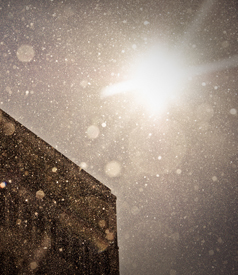Washington – We’re the nation that put a man on the moon, so we can’t be stupid. We’re just pretending, right? We’re not really taking seriously the “argument” that the big snowstorms that have hit the Northeast in recent weeks constitute evidence — or even proof — that climate change is some kind of hoax.
That would be unbelievably dumb. Yet there are elected officials in Washington who apparently believe such nonsense. Sen. Jim Inhofe, R-Okla., had his family build an igloo near the Capitol and label it “Al Gore’s New Home.” Sen. Jim DeMint, R-S.C., boasted on Twitter that the snows would continue “until Al Gore cries uncle.” Talking heads are seriously debating whether the record snowstorms doom the prospects for comprehensive legislation to deal with energy policy and climate change, which is one of President Obama’s top priorities.
It is true that Washington is slogging through its snowiest winter on record. Before I could bring in the newspaper on Thursday morning, I had to dress for a mountain-climbing expedition because my front yard resembles a small glacier. My commute to the office normally takes 20 minutes; it took more than an hour, as I fought my way through streets whose outside lanes have been encroached by huge snowbanks.
But that was nothing compared to Tuesday morning, when I awoke to find that a snowplow had blocked my car into the driveway with a two-foot berm of ice. I had an early appointment, so I had to shovel my way out — before coffee. I’m afraid that the first thing my neighbors heard that morning was some unneighborly language.
Still, even this unpleasant experience didn’t make me crazy enough to entertain the notion that a snowstorm or two — in a city where it snows every year — could somehow disprove all the scientific evidence for climate change.
Nor did it even cross my mind that our Snowmageddon, inconvenient though it might be, could meaningfully alter the political debate over climate legislation. That would be idiotic. As comedian Stephen Colbert pointed out, it would be like looking outside at night, seeing the darkness, and concluding that “the sun has been destroyed.”
As even Sens. Inhofe and DeMint surely are aware, the Earth is really, really big. (And it’s not flat. It’s shaped like a ball. Honest.) It’s so big that it can be cold here and warm elsewhere — and this is the key concept — at the very same time. Even if it were unusually cold throughout the continental United States, that still represents less than 2 percent of the Earth’s surface.
Those who want to use our harsh winter to “disprove” the theory that the planet’s atmosphere is warming should realize that anecdotal evidence always cuts both ways. Before the Winter Olympics in Vancouver, crews were using earth-movers and aircraft to deposit snow on the ski runs — the winter had been unusually warm. Preliminary data from climate scientists indicates that January, in terms of global temperatures, was actually hotter than usual. Revelers participating in Rio de Janeiro’s annual carnival, which ended Tuesday, sweltered in atypical heat, with temperatures above 100 degrees. Fortunately, the custom during carnival is not to wear much in the way of clothing.
It has been a bad few months, to say the least, for those brave enough to still call themselves “climate scientists.” First, some e-mails were unearthed that showed some leading researchers to be petty, vindictive, and perhaps willing to ignore data that didn’t fit their theories. Then it was learned that an official U.N. document on climate change overstated the rate at which Himalayan glaciers are believed to be melting. As other examples of sloppiness or imprecision emerged, the winter turned harsh. Critics piled on, sensing that the moment had arrived to kill any serious global effort to address humanity’s impact on the temperature of the biosphere.
But here’s what those bad few months can’t change: Decades of study by scientists around the world has reached the conclusion that the Earth is warming and that humankind is probably responsible. The past decade was the warmest on record. Among the anticipated effects of climate change are increased precipitation — not just rain, but also snow — and bigger storms. What we’ve seen this winter tends to prove, not disprove, the scientific consensus that warming is real.
But there is one unanswered question that I want climate scientists to address: Please tell me when the Robinson Glacier outside my house is going to melt.
Eugene Robinson’s e-mail address is eugenerobinson(at)washpost.com.
(c) 2010, Washington Post Writers Group
Trump is silencing political dissent. We appeal for your support.
Progressive nonprofits are the latest target caught in Trump’s crosshairs. With the aim of eliminating political opposition, Trump and his sycophants are working to curb government funding, constrain private foundations, and even cut tax-exempt status from organizations he dislikes.
We’re concerned, because Truthout is not immune to such bad-faith attacks.
We can only resist Trump’s attacks by cultivating a strong base of support. The right-wing mediasphere is funded comfortably by billionaire owners and venture capitalist philanthropists. At Truthout, we have you.
Truthout has launched a fundraiser to raise $38,000 in the next 6 days. Please take a meaningful action in the fight against authoritarianism: make a one-time or monthly donation to Truthout. If you have the means, please dig deep.
